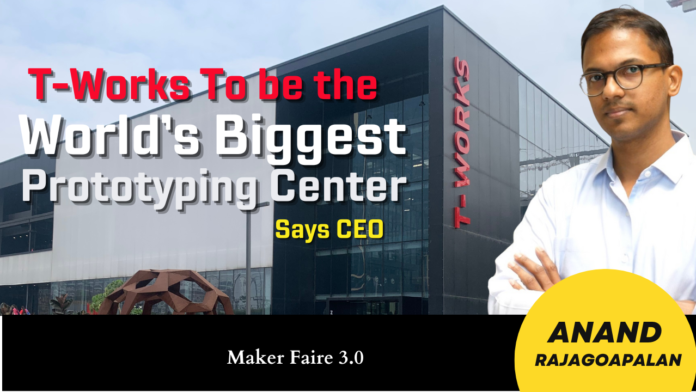T-Works aims to become the world’s largest prototyping center by next year, says new CEO Anand Rajagopalan, speaking at Maker Faire Hyderabad, held on December 16 & 17, 2023.
- T-Works plans significant growth by doubling down on its efforts.
- Increase equipment and prototyping capabilities by tenfold, from 10 crores to 210 crores worth of equipment.
- A new 30,000 sft facility called a “dirty process outpost” for various activities like woodworking, welding, and forging in the works.
- T-Works will also focus on building a product team to provide support, experiment with technologies, and disseminate knowledge.
T-Works, Hyderabad’s premier prototyping center, supports startups, with 45-50% of its users being registered startups. They collaborate closely with startups, treating them as partners, and incorporate their feedback to enhance services and equipment offerings. On December 16 and 17, T-works hosted the third edition of Maker Faire, serving as a platform to raise awareness, promote creativity, and foster collaborations among artists, engineers, and designers while highlighting the Hyderabad innovation ecosystem. The Maker Faire aims to promote a culture of making and creativity by offering diverse workshops for all ages, nurturing creativity from childhood, and engaging parents in the process, says Anand Rajagopalan the new director of T-Works who took over this week.
In this exclusive first interview to MyStartupTv’s consulting editor Sunil Patil, CEO Anand Rajagopalan lays out plans for T-works, including a tenfold increase in equipment and prototyping capabilities, a new 30,000 square-foot facility for “dirty processes,” and the goal of becoming the world’s largest prototyping center.
Excerpts from the interview (full interview on MyStartupTv and on MyStartup Podcast.)
Sunil Patil: What is the significance of Maker Faire at T-Works Hyderabad?
Anand Rajagopalan: Maker Faire 2023 at T-Works Hyderabad is a celebration of innovation, creativity, and the act of making things by combining both mind and hands. It brings together art, science, and engineering in a collaborative environment, making it a unique event in India.
SP: Could you share the background and purpose of Maker Faire at T-Works?
AR: Maker Faire at T-Works started in 2018 intending to create a culture of making in India, where art, science, and engineering converge. The event aims to inspire creativity and innovation, emphasizing that any product is a result of this multidisciplinary approach.
SP: How does Maker Faire promote collaboration and a diverse range of skills?
AR: Maker Faire at T-Works encourages collaboration by showcasing the fusion of art, science, and engineering. It demonstrates that products are the outcome of diverse skills and talents working together, fostering an environment where startups can thrive and compete globally.
SP: What impact do you hope Maker Faire will have on the Indian innovation landscape?
AR: Maker Faire’s impact goes beyond the event itself. It aims to inspire and motivate people to embrace the culture of making, leading to the emergence of startups and companies capable of competing on a global scale, ultimately contributing to India’s innovation landscape.
SP: How has the response been from families and children attending Maker Faire?
AR: Families and children have shown a tremendous amount of curiosity and interest in Maker Faire. The event has attracted a diverse audience, reflecting the growing enthusiasm for hands-on creativity and innovation.
SP: How is T-Works effectively merging craft and artisanship with technology for a wider population?
AR: T-Works employs a two-pronged approach: Firstly, by raising awareness that product development is a collaborative effort, with events like Maker Faire playing a pivotal role. Secondly, they put this theory into practice by co-innovating with users and customers, educating them on the importance of design in enhancing functionality and user experience.
SP: Where does the necessity for innovation originate, and how does T-Works support it?
AR: Necessity often arises from passionate individuals, whether they aim to start a business or pursue their creative passions. T-Works encourages individuals to follow their interests and learn through experimentation. They lower barriers, offering resources and equipment to facilitate product development.
SP: How does T-Works support startups and the innovation ecosystem?
AR: Approximately 45-50% of T-Works’ users are registered startups. T-Works collaborates closely with startups, incorporating their feedback to tailor services and equipment offerings. Startups are not just users but partners, contributing to the growth and evolution of T-Works.
SP: What is the role of Maker Faire in T-Works’ ecosystem?
AR: Maker Faire primarily serves to raise awareness about T-Works, showcasing its capabilities, fostering creative collisions among artists, engineers, and designers, and highlighting the Hyderabad ecosystem. It aims to inspire creativity and innovation, targeting individuals from various age groups and backgrounds.
SP: How does T-Works promote a culture of making and creativity?
AR: T-Works’ vision is to create and celebrate a culture of making in India, encouraging exploration and experimentation without the fear of failure. They offer a diverse range of workshops for people of all ages, nurturing creativity from childhood while also engaging parents in the process.
SP: What are T-Works’ future plans for the next one to two years?
AR: T-Works plans to expand significantly in the coming years. They will increase the value of equipment and prototyping capabilities tenfold, add a new 30,000 square-foot facility for “dirty processes,” such as woodworking and forging, and continue to build their product team. The goal is to become the world’s largest prototyping center by next year.




